
newsletter for faculty and staff | spring 2019
Interesting times & another passage to India
I might be tempting fate writing a lead in to the so-called Spring Issue while continuing to defer switching over to summer tires, but this has definitely been one of the more unpredictable winters I can remember. There are not too many nights in late March when my dog takes a decidedly dim view of heading out on our customary midnight ramble, but recently we have had a number of reluctant forays.
These swings and uncertainties are certainly mirrored in our political situation, especially as far as Higher Education is concerned. While we were all expecting some kind of cut to university funding once the Ford government was installed, none of us thought it would come in the form that it did. And now we have turbulence at the Federal level as we head into a fall election. Interesting times some might say, but I am growing weary of interesting times, whether we are speaking of the weather or higher education policy and funding.
The Faculty’s finances, like those of the University as a whole, took a hit when the tuition cut was announced. Ten per cent cut to all domestic tuition with effect this year, and then a one year freeze. While domestic tuition is only part of our revenue – international tuition and the provincial operating grant are safe (at least for now), the impact is in fact larger than 10 per cent as we had been modelling, as we have in the past tuition increases, to try and keep step with inflation. The Board of Governors at its meeting on 2 April approved a budget which saw the tuition cut absorbed across the university, including a one-time 1 per cent contribution from each Faculty. Going forward we can expect further pressures to constrain costs while we seek new revenue streams. Over the next couple of months we will be delving more deeply into our Faculty’s finances, retrieving and analyzing data to enable us better to respond to these challenges.
On the plus side, in a few days I will be part way to India. Bill (Chesney) and I are joining colleagues from Environment, Science, and Marketing and Undergraduate Recruitment on a whistle stop tour of four Indian cities (Delhi, Mumbai, Hyderabad, Bengalaru) which I had visited on two previous recruitment trips (see photo), and where our particular approach to a 21st century Arts education had struck a responsive chord.
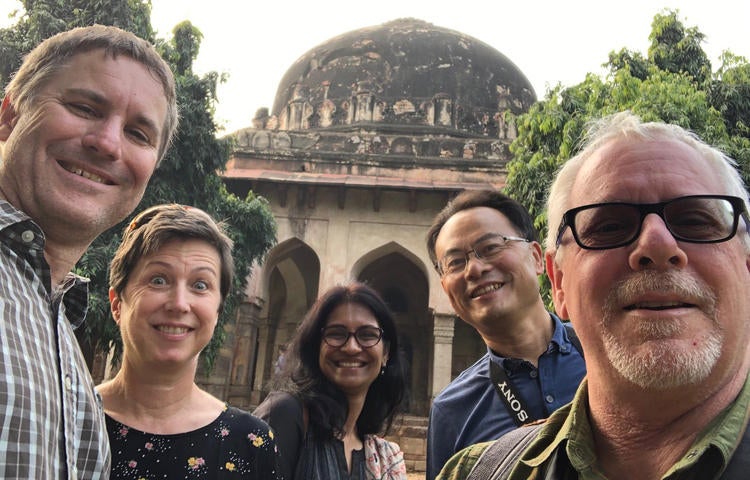
Applications from India are up nearly 150 per cent and these prospective students are interested in programs right across the Faculty. They are drawn to the many joint honours combinations we offer, Arts and Business, and the range of career focused and interdisciplinary minors on our books. Interestingly, and I will admit somewhat surprisingly at first, we do not find as much interest in co-op. This may be due to the fact that it adds time to the degree, but is more likely due to our as yet undiscovered way to make co-op comprehensible in an Indian context.
Our unique blend of disciplinary depth, interdisciplinary opportunities, and real-world applicability is just as evident at the graduate level. The Datafest and the Arts 3MT heat detailed later in this issue are perfect examples of how our students learn and apply knowledge and skills in innovative and engaging ways. The only problem was that these two events were scheduled at the same time. Despite having the Institute for Quantum Science on campus, I was not able to discover the secret of Schrödinger’s cat and so was forced to dash between the two.
Interesting times these might be, but I take comfort from the fact that despite the turbulence outside, there are many more interesting and encouraging things happening within the Faculty.
It's official: Sheila Ager to be our next Dean of Arts
Sheila is a full professor in the Department of Classical Studies and currently serves as interim chair for the Department of Fine Arts. For over 30 years she has served her department, Faculty and the University in a variety of roles, including chair of the Department of Classical Studies (2009-17), Associate Dean of Arts, Undergraduate Studies (2001-07), two terms as a member of Senate, and one term as a member of the Board of Governors. She is currently Director of the Waterloo Institute for Hellenistic Studies, and, since 2016, has been Director of the University of Waterloo’s Academic Leadership Program.
Sheila completed her BA and MA degrees at Queen’s University, and earned her doctorate from the University of British Columbia. She is a scholar of Greek history, specializing in the Hellenistic age – the years between the death of Alexander the Great in 323 BC and the suicide of Cleopatra in 30 BC. Often engaging interdisciplinary approaches, much of her research has centered on interstate relations in this period, including peaceful dispute resolution.
On Sheila's appointment, Vice-President, Academic & Provost Jim Rush said: “Over her years at this university, Professor Ager has clearly proven her excellence and dedication in both academic and administrative leadership roles. I’m pleased and confident that her collaborative leadership style, combined with a deep institutional knowledge, will serve the Arts and University community very well.”
Bill Chesney reflects on more than a decade of ADing
» Bill Chesney, Associate Dean, Undergraduate Students
When I started working at Waterloo in 1993, the Arts undergraduate population was significantly smaller than it is today. The landscape has changed a lot since then, and the student experience along with it. Even in the 11 years since I started as Associate Dean, Undergraduate Studies, there have been big changes: for one, we admit almost twice as many students now. That increase means our student body is far more diverse — in every sense. They arrive at university differently prepared, and they have greater expectations for their overall student experience.
The world has changed. Young people have changed as well, in some respects; in others though, they are as they have always been: excited to be on their own, anxious about making friends and doing well, curious about the world and their evolving sense of their own path in it. What’s different now, however, is that undergraduates start university in the context of a world that delivers consistent messages of doom and gloom: an impending climate change crisis that is unstoppable; evident economic and social inequality; a strong sense that things in the world are getting worse, not better. As are we all, students are drowning in an ocean of information. What they need are tools to help them chart their own path to make a positive difference, large or small. Allegedly, those tools are what they are here to acquire.
No wonder they are stressed!
I sympathize; I really do. When students wind up having a Policy 71 meeting with me, 9 times out of 10 I can see that they are not “cheaters” in the way we used to understand the word; they are young people who ran out of time, and out of options, and who have made a bad or sloppy decision. My job in that moment is not to pass judgment on their characters; my job is to try to protect the integrity of the credential, and the work of other students who have also struggled, but without resorting to such desperate measures. At the same time, I take into account, as I can, the individual situation that presents itself. It’s been endlessly interesting, and by no means the most difficult part of the job.
The work has challenged me to strike that balance over and over again: imposing a fair disciplinary outcome that reflects the gravity of the situation, while still making evident my own reading of the individual circumstances. It has taught me to make decisions based on something more than “trusting my gut” or my own “common sense,” which, as we all know, can be biased if not examined carefully. It has taught me to weigh evidence in a more formal way – very different from the kind of creative decision-making in the theatre with which I am familiar.
And while I have had my decisions appealed a number of times, and not always upheld, those of course are also the most important learning opportunities.
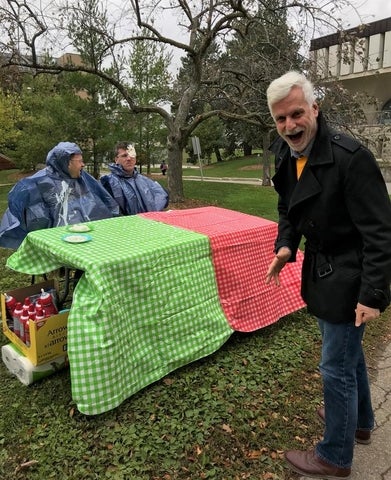
Bill tosses a pie or two for United Way, fall 2018.
What I have found harder is knowing how to combat an environment where any question can seemingly be answered with just a few keystrokes with the rising tide of online services that “help” students make their studies “easier.” Ultimately, every undergrad must come to terms for themselves with what mastery actually represents to them, in the context of the academic path they have chosen and the outcomes they are seeking. It’s our privilege and responsibility to model the myriad ways they might do so.
More than anything else, it is the people in our Faculty and beyond – like the wonderful, dedicated staff in the AUO and the Registrar’s office – who make our convoluted and imperfect systems actually work for students. These colleagues have taught me the most about paying attention, and inspired me to do my best to add value and improve things, whatever the project. The comprehensive knowledge and measured thoughtfulness that everyone offers so willingly is a resource I have relied on again and again. Any initiative of which I am proud, like plan standardization, could only succeed because of the good will and hard work of all of them – all of you, colleagues. Thanks for everything!
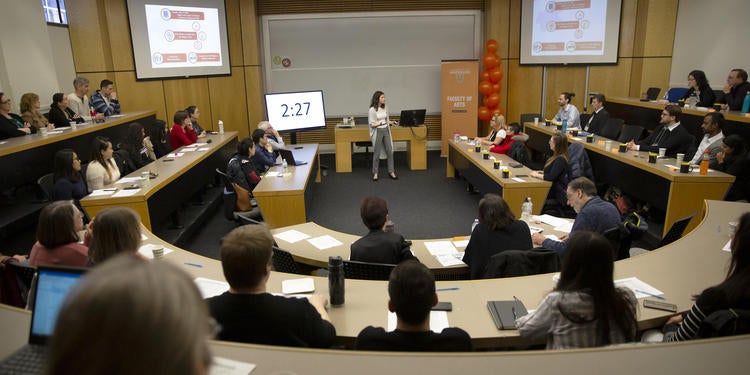
The Arts 3 Minute Thesis heat was hot indeed
» Kaitlin O’Brien, Graduate Recruitment Officer
On March 1, graduate students from Accounting, Anthropology, English, French, Philosophy, Political Science and Religious Studies convened for the annual Arts Three Minute Thesis (3MT) heat. All the 3MT competitors offered the full-house audience thoughtful and engaging presentations.
The event serves as a great opportunity for students to share their research ideas with their peers and a rapt audience, perfect their ‘elevator pitch’, and convey the significance of their work. This year we were excited to have 16 graduate students present their research, and from that group, the top two Arts 3MT heat winners advanced to the University 3MT competition on Wednesday, March 20.
We’re proud to announce the 2019 Arts 3MT winners:
- 1st place: Kathryn Morrison, Applied Philosophy PhD candidate – The Right to Die for Mature Minors. Watch Kathryn’s 3MT on YouTube.
- 2nd place: Emily Grant, Cognitive Neuroscience PhD candidate – Exploring the restorative effects of… greenspaces? Watch Emily’s 3MT on YouTube.
- 3rd place: Michelle Ashburner, Cognitive Psychology PhD candidate – Saving Lives Through Charitable Donations. Watch Michelle’s 3MT on YouTube.
- People’s Choice: Andriy Struk, Cognitive Neuroscience PhD candidate – Of Fruit Flies and Men: The Role of Genes in Human Foraging. Watch Andriy’s 3MT on YouTube.

2019 3MT winners, from left to right: Kathryn Morrison, Emily Grant, Michelle Ashburner and Andriy Struk.
MPS Policy Datafest: 60 students hack for better policy making
» Wendy Philpott, Communication Manager
While much of the world is talking big data, the story in Canada seems to be our shortage of it. Recent media reports about our country’s data deficit may be true to an extent, says Anindya Sen of Economics, but there are actually good datasets available through open government portals. The challenge is fully utilizing them to make informed policy decisions that improve people’s lives.
That’s why Sen organized the Master of Public Service (MPS) Policy Datafest. The event brought contemporary policy questions faced by different levels of government to Faculty of Arts graduate students, challenging them to use their analytical skills to mine datasets and extract meaningful insights to inform policymaking.
While hackathons and other data mining competitions certainly aren’t new, what makes this data hacking event unique is that all 60 hackers were from humanities and social science fields.
“Much of the data deficit could be addressed by ensuring people have the skills to not only know how to look for data, but how to interpret it,” says Sen, who is the current director of Waterloo’s MPS program.
Sen collaborated with federal, provincial and regional government departments and agencies to develop the hacking event. Datafest was held over two days with 14 teams of students from six arts graduate programs, including MPS, Economics, English Language and Literature, Global Governance, Psychology and Sociology. Teams were provided specific datasets and questions about Canadian social, economic and environmental conditions. Then it was up to the students to dive into the data to find answers and develop policy recommendations. [...] Read the full story in Waterloo Stories.
Datafest is a great experiential learning opportunity for students in the social sciences and humanities because they are the ones who go on to work on policy questions in government or private sectors.
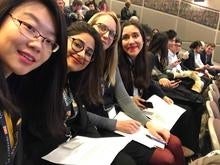
This MPS team won 2nd place at Datafest for their work on correlations between education level and gender pay gaps.
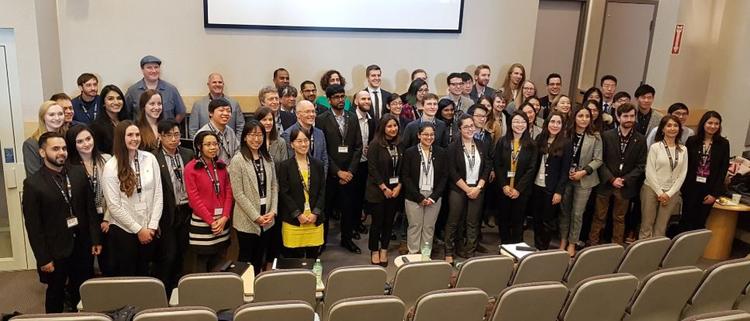
MPS Policy Datafest graduate student competitors from MPS, Economics, English Language and Literature, Global Governance, Psychology and Sociology.
Two more Distinguished Teacher Awards
» from the Centre for Teaching Excellence
The 2019 Distinguished Teacher Award were announced at Senate and we’re proud to say that once again two Arts professors are among the four recipients! In case you didn’t know, 70 Arts professors have been recognized for their achievements since the awards started in 1976 - more than any other faculty.
Congratulations to this year’s recipients!
Steve Balaban, Accounting and Finance
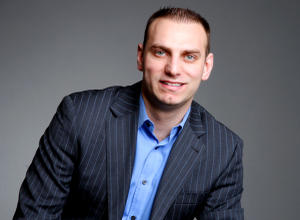
Steve Balaban, a lecturer in the School of Accounting and Finance, has received many praises from not only his students and his fellow colleagues in the Faculty of Arts, but also from his colleagues in other faculties. Balaban influenced the careers of several of his students, and continues to be a mentor to them long after their graduation.
His peers admire the efforts he has made to incorporate new and interactive learning techniques into his lesson plans, such as problem-based learning and experiential learning. His students also really appreciate his efforts, as one student noted: “His lectures never felt like lectures, but rather interactive discussions.”
Balaban shows genuine interest in seeing his students succeed, and many have commented on the integral role he has played in their professional and academic success. His lessons are known to emphasize “the importance of personal development, teamwork, communication, and relationship building.” Balaban has been described as “passionate,” “engaging” and “humble.”
Additionally, it is noted that his most admirable quality is “his constant desire to improve his teaching abilities and the learning environment.”
Andrew Houston, Communication Arts
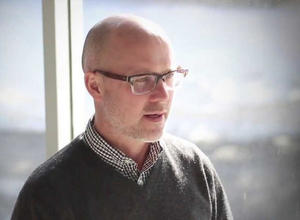
Professor Andrew Houston is widely known in the Theatre and Performance program as an “inspiring mentor,” a “gifted teacher” and a “generous collaborator.” Students have described Professor Houston as “warm, welcoming and eccentric.” They also appreciate the “consistent care, compassion and support” that he provides them with; which follows them well beyond graduation. His dedication and passion for theatre arts has had lasting impacts on several of his former students; including those who have since moved on to pursue occupations in different fields.
Additionally, he uses his strong network of contacts to provide them with opportunities to further their careers. It is noted by many students that his most outstanding quality is his ability to engage diverse learners in his lessons. As one student commented: “He makes sure to teach each concept by explaining it in multiple different ways, so that everyone understands.” One of his peers noted that his dedication to collaborative pedagogies “enriches and strengthens the department, the work of his colleagues, and the university as a whole.”
Houston is highly regarded by students, alumni, colleagues and local artists in the community.
The Nature of Experiment: Intelligence, Life, and the Human (April 8)
» Profs. Fraser Easton, Alice Kuzniar, John Savarese, James Skidmore
Mary Shelley’s famous invocation of human experimentation gone wrong is more than 200 years old, but remains as vibrant an analysis of the human implication of scientific insight as it did when it was first published; perhaps more so in an age on the verge of breakthroughs in both AI and bioengineering.
What are the consequences of experimentation? How has experimentation changed since Shelley wrote Frankenstein? These are just the preliminary questions to be explored at The Nature of Experiment interdisciplinary conference, April 8 here on campus.

The conference will approach the intersections of intelligence, life, and the human from a unique perspective: the concept and practice of the “experiment,” both today and in the past. Contributors include researchers from UWaterloo German, English, Philosophy, Psychology, Political Science, Computer Science, and Kinesiology - as well as visiting scholars.
Read the full conference schedule.
The Nature of Experiment is sponsored by the Waterloo Centre for German Studies, the Faculty of Arts, and the departments of Philosophy and English Language & Literature.
The conference is free and open to everyone. Please register online.
Upcoming events

Global Engagement 2019 Summit: Socio-Cultural and Political Implications of Artificial Intelligence
April 3 - 4

Caesura// Fine Arts 4th year undergraduate exhibition
Open until April 6

MFA Thesis One: Lauren Prousky & Patrick Allaby
Opening reception April 11

Celebration of Arts, featuring 2019 Arts Awards presentations
April 24

Arts Convocation
June 12
Feedback?
Inside Arts is published each term. Comments, ideas, and submissions are always welcome. Please contact Wendy Philpott.

* Banner image graphics inside "ARTS" from Welcome to the Tree Museum promotional image, designed by William Innes (BA '14). The Theatre and Performance program produced this original play March 18 - 23.
